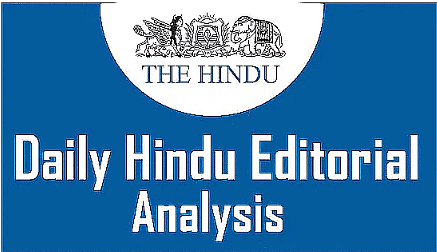The Hindu Editorial Analysis- 7th January 2023 | Current Affairs & Hindu Analysis: Daily, Weekly & Monthly - UPSC PDF Download
| Table of contents |

|
| Political Parties |

|
| Historical Background |

|
| Eligibility For Status Of Political Party |

|
| Functions Of Political Parties In India |

|
| Conclusion |

|

Political parties are not like companies
Context
A popular trope among political commentators, especially in the aftermath of important elections, is that political parties are like corporations and their leaders like CEOs. The analogy is made to press home the point that just as CEOs are held accountable for a bad quarter, so should the leaders of political parties for poor election results.
Introduction
The political parties are basically an organized group of persons that have common ideas on governance and work together as a political entity to gain control of the government in order to forward their agenda and policies. The political parties in India's governance system are divided into two categories: national political parties and state or regional political parties.
Political Parties
Definition: A political party is an organized group of persons that have common ideas on governance and work together as a political entity to gain control of the government in order to forward their agenda and policies.
Aim: They keep the public in touch with those who represent them in government and opposition.
Constitutional Status: Political parties are extra-constitutional in India, but they remain the lifeblood of the political system.
Historical Background
- From 1952 until 1964, the Congress Party was the dominant political party in India, and the country's democracy was basically a one-party system known as the 'Congress system'.
- With the death of Jawahar Lal Nehru and the 1967 elections, the congress system's supremacy was challenged. The Congress lost majorities in eight states, and its Lok Sabha majority was reduced to 54% of the seats. Regional parties began to sprout up around the country.
- In 1977, a new coalition led by the Janata Party developed. In India, this resulted in the formation of a multi-party system. Rather than forming an ideological consensus, a number of smaller parties banded together to challenge Congress.
- From 1989 to the present, there has been a multi-party system and coalition politics.
Eligibility For Status Of Political Party
A party is recognized as a State Party, if any of the following requirements are met:
- If it wins at least 6% of valid votes polled in a general election held either to the Lok Sabha or Legislative Assembly of the State and also wins at least 1 seat in Lok Sabha or 2 seats in the Legislative Assembly of the state.
- If it wins at least 8% of valid votes are polled in a general election held either to the Lok Sabha or Legislative Assembly of a state.
- If it wins at least 3% of the total number of seats in the Legislative Assembly of a state or 3 seats in the Legislative Assembly whichever is higher.
- If it wins at least 1 seat in Lok Sabha out of every 25 seats allocated to the States in Lok Sabha.
- There are 64 political parties that have been recognized as State Political Parties by the Election Commission at present.
A party is recognized as National Political Party (NPP) if a full fill any of the following conditions:
- If it wins at least 6% of valid votes polled in a general election held either to the Lok Sabha or Legislative Assembly of the State in 4 or more states and also wins at least 4 seats in Lok Sabha from 1 or more states.
- If it wins at least 8% of valid votes polled in a general election held either to the Lok Sabha or Legislative Assembly of a state in 4 or more states.
- If it wins at least 2% of the total number of seats in the Lok Sabha from 3 or more states.
- There are 8 political parties that have been recognized as National Political Party by the Election Commission at present.
- Latest NPP: The Election Commission of India has designated the National People's Party (NPP) as India's eighth national party, making it the first regional party from the northeast to get this honour.
Functions Of Political Parties In India
- During elections, they nominate candidates.
- The campaign to gain support for their election candidates.
- They use manifestos to put their goals and programs in front of voters.
- Those who win a majority in elections form the government and enact and implement policies; those who win a majority in elections form the government and enact and implement policies.
- Those who are not in power form opposition and keep the government in check.
- When they are in the minority in the legislature, they form an opposition and put persistent pressure on the administration for good governance.
- They educate the public and assist in the formation and shaping of public opinion.
- They express people's demands and communicate them to the government.
Conclusion
It is past time to de-communalize political parties and constitutionalizes them in order to secure intra-party democracy and financial transparency.
|
63 videos|5408 docs|1146 tests
|















